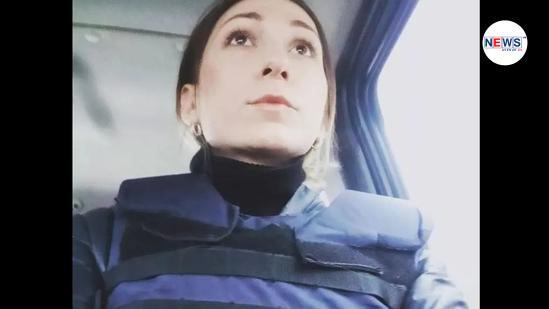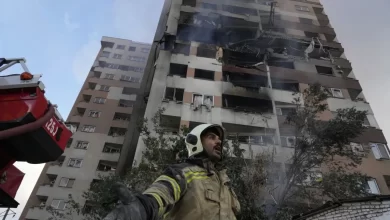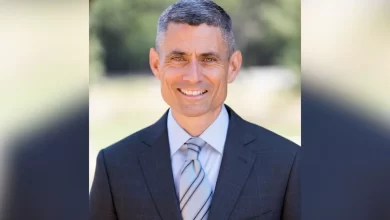
Who was Victoria Roshchyna? Body of Ukrainian reporter captured by Russia was returned with ‘numerous signs of torture’
The body of a Ukrainian journalist was returned to her home country after she was kidnapped and killed by Russians. Victoria Roshchyna’s eyes, brain and larynx had been removed, possibly a move to hide evidence of torture she endured, according to an investigation.
Roshchyna’s body was returned to Ukraine in February, after she went missing in Russian-occupied Ukrainian territories in August 2023. During an exchange of 757 Ukrainians’ remains, the 27-year-old’s body was handed over, having been labelled as an “unidentified male,” the New York Post reported. A Russian marking, “SPAS,” possibly meaning “total arterial damage to the heart,” was discovered on the Russian listing.
A report from Forbidden Stories published recently stated that Roshchyna’s body was much smaller and lighter than the others. It showed obvious signs of torture, including abrasions, hemorrhages, a broken rib and possible evidence of electric shocks, the head of the Ukrainian Prosecutor General’s Office’s war crimes department, Yuriy Belousov, told Pravda. The report claimed that a bruise on her neck possibly indicated strangulation.
According to preliminary forensics, there were “numerous signs of torture,” a prosecutor said, as reported by The Guardian. Her hair, which she wore long, had been shaved.
Roshchyna’s official cause of death has not been determined because of the mummified state of the body. Ukraine’s Office of the Prosecutor General is reportedly arranging further tests. Prosecutors told Ukrainian outlet Hromadske that the victim’s father has requested additional foreign exams too.
Who was Victoria Roshchyna?
Roshchyna wrote for various Ukrainian outlets as well as Radio Free Europe. Russia confirmed her detention only in May 2024, nine months after she went missing. She was placed in a penal colony in Berdyansk, eastern Ukraine, which is infamous for being one of Russia’s harshest facilities for Ukrainians, according to the Media Initiative for Human Rights.
Roshchyna later spent time in a pre-trial detention center in Taganrog, just over the border in Russia. She died during transportation to Moscow.
In March 2022, Roshchyna was held by the Russians for ten days. She earned the International Women’s Media Foundation’s 2022 Courage in Journalism Award.
Roshchyna was known to her family as Vika. Her father was a veteran of the Soviet war in Afghanistan. When Russia annexed Crimea, Roshchyna was 17. She and her sister were raised in Kryvyi Rih, where her parents still live.
Roshchyna’s colleagues said she was uncompromising and loved her job. “She had no life beyond her job, no friends, no partner. But also doing extraordinary work. For her it was a mission,” said Sevhil Musaieva, the editor-in-chief of Ukrainska Pravda. “She was one of the bravest journalists I met in my career.”
In an attempt to protect her sources, Roshchyna used multiple phones and set her messages to disappear. She even wrote articles in files that would self-delete. Sometimes, she would disappear for weeks, and then return to file her reports.
In March 2022, Roshchyna was captured by a soldier and turned over to agents of the Russian Federal Security Service (FSB) while she was reporting from the occupied city of Berdiansk. At the time, she was forced to record a propaganda video. However, she was eventually released, following a public outcry.
When she returned home, her colleagues urged her to seek therapy and rest well as her state of mind had become fragile. She had also become very thin.
However, Roshchyna continued to work, exposing the intimidation of workers keeping the Zaporizhzhia nuclear power station running, and also investigating the shooting of two 16-year-old boys who had opposed the occupation.
Musaieva revealed that on Roshchyna’s last journey, she was trying to find the location of black sites, basements or industrial buildings where Russian security operatives would torture and interrogate civilians. Civilians would reportedly often be forced to make false confessions. Roshchyna was putting together a list of the FSB agents responsible.
A prosecutor believes after Roshchyna was captured, she was taken to a black site in Melitopol known as the “garages.” According to the testimony of a cellmate, who was released last September, Roshchyna said she was tortured there. The cellmate said, “During interrogations, they used electric shocks … She got stabbed a few times – I saw them on her: arm for sure, leg too … Fresh knife scar – forearm, soft tissue between wrist and elbow. A scar of roughly 3cm, pierced through. She said one guy, she called him a jerk … was brutal, unhinged.”
The former cellmate of Roshchyna said she had stopped eating after her capture. “We would talk to her but she was lost in her head, eyes terrified,” the cellmate recalled, adding that Roshchyna would lie “curled up foetal on the floor” behind a curtain that screened the toilet.
Roshchyna’s weight reportedly dropped to 30 kg. “She could stand up, but only with me helping as she was in such a state that she could not even lift her head off the pillow. I would prop her up and she would grab the top bunk to pull herself upright,” her cellmate said.
In November 2022, Roshchyna opened up on what motivated her, after she was given the award for courage by the International Women’s Media Foundation. “We have remained faithful to our mission, to convey the truth to the world, countering Russian propaganda,” she said. “Unfortunately, many journalists have died. I want to dedicate this award to them. After all, they died in the fight for the truth, trying to record Russian crimes. I thank them.”





